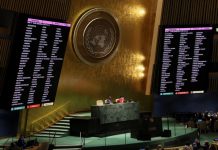Faced with the economic challenges of Covid-19, Emmanuel Macron’s government rethinks his economic philosophy. Macron’s promise to loosen the shackles of a heavy state is less plausible in the current economic conditions, and with that, his startup nation mantra is taking a back seat.
To spearhead through the crisis, a former cabbie has been inducted into the cabinet. An entrepreneur who failed his high-school diploma, 67-year-old Alain Griset has been thrust into the central role of applying the policies of Macron; an elite-educated investment banker president of France.
Griset’s mission as Minister for Small and Mid-sized Companies is instead to ensure France’s economic backbone of local run small firms survive the crisis brought on by the pandemic. “I was appointed to deliver a message to the country’s 3 million entrepreneurs: You matter,” Griset said in an interview. He further stated:
“The President’s message is: You are in the regions, you train people, you give them jobs, you count for me. So here’s a minister for you.”
Alain Griset was born to a metalworker father and a mother who did not pursue a career. After failing his baccalaureate exam, he entered as a switchboard operator in a taxi company at the age of 19. Later taking his driver’s license and the taxi exam at age 21, he created his taxi business on 1st September 1975 in Lille. In 1989, he was elected to the Chamber of Trades and Crafts of the North then, in 1995, became President of this public establishment, a position he held until the creation of the Chamber of Trades and Crafts. of Nord-Pas-de-Calais in 2005. President of this body, he was then elected president of the Permanent Assembly of Chambers of Trades and Crafts from 2000 to 2016, the longest term seen by the organisation.
Macron’s economic plan precedes his presidency; he had initiated the model as Minister of Economy and Industry — in August 2014 under Prime Minister Manuel Valls — by cutting red tape and public expenses while encouraging tech startups to blossom. But the coronavirus pandemic forced his government’s expenditure in welfare such as fire-fighting, handing out state aid, offering hundreds of billions of euros in loan guarantees and effectively nationalising private payrolls with France’s emergency furlough program. In July — which saw a broad government shuffle, which resulted in appointing Griset — facing an economic meltdown with two years until elections, the president said both he and the French must reinvent themselves.
Even with this recent cooperation, Macron and Griset have had their differences in the past. Before 2017, when Macron served as the Minister of Economy and Industry, Griset opposed his signature reform — the so-called Macron Law — that aimed to change France’s labour code and dismantle the monopolies of notaries, bailiffs and other professions. The approach clashed with the interests Griset represented as head of a national taxi union and a senior member of the chamber of artisans. “I’m not against reform, but reform doesn’t mean you smash everything,” said Griset, 25 years Macron’s senior. “We haven’t always agreed on these topics, but that didn’t stop him making me a minister.”

The government has had to innovate during the pandemic in keeping afloat many of the businesses and freelancers championed by Griset as they fail to benefit from the broad loan guarantees and furlough programs tailored to employees on traditional work contracts. It has regularly boosted a so-called ‘solidarity fund’ to compensate for the lost revenues of small business owners from Parisian bistros, to florists, taxi drivers, and developers. More than 9 out of 10 businesses in France employ fewer than 20 people, according to Griset, making small companies the core of the economy and an important political constituency.
“If we had we told the French: Stay home, but you won’t get paid, what would have happened? We’d have had vests in every colour, not just yellow,”
Said the Minister, referring to the grassroots movement for social justice that errupted in 2018.
Griset says he works 18 to 19 hours a day, meeting dozens of people and sleeping in his apartment at the ministry. Part of his job is to review how businesses affected by measures to curb the epidemic can transform themselves – he cited nightclubs reopening as bowling alleys. Aside from crisis measures, Griset is working on a plan to improve the business environment for the self-employed by streamlining tax administration and simplifying legal statutes.
The businessman who built up a taxi service from scratch is also considering re-taking the high school diploma. He joins a call by Macron, who graduated from France’s ultra-elite Ecole Nationale d’Administration, to move away from a society where one exam can get you employment for life. “My appointment raises hopes among entrepreneurs,” he said. “My goal is not to disappoint them.”









